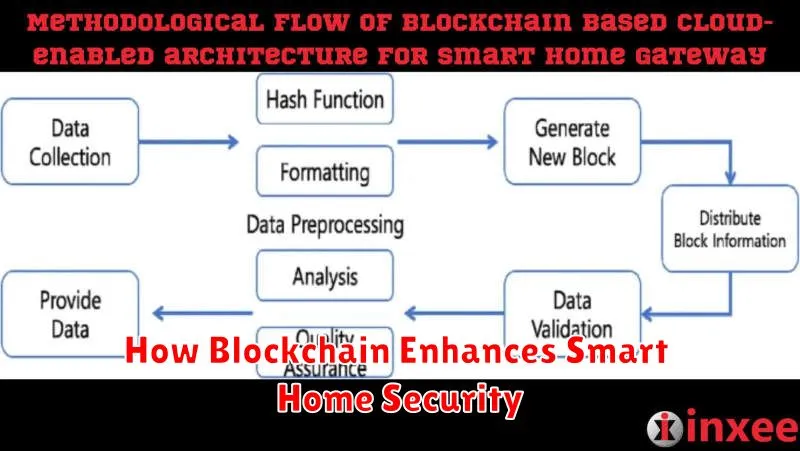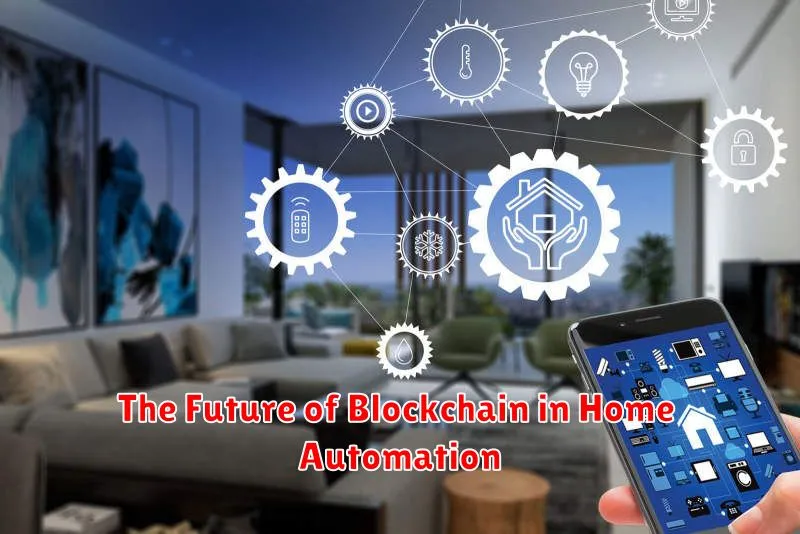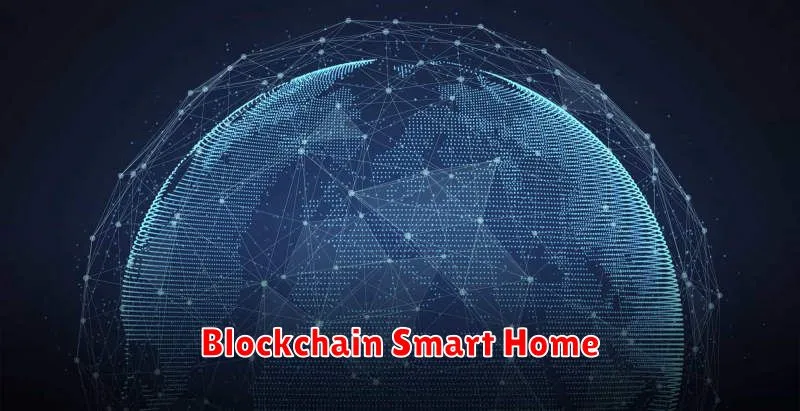The intersection of blockchain and smart homes is poised to revolutionize the way we live, manage our homes, and interact with our environment. Gone are the days of clunky, centralized systems; the future of home automation lies in a decentralized, secure, and transparent ecosystem powered by blockchain technology. This transformative technology has the potential to address many of the current challenges in smart home development, offering a more secure, efficient, and user-friendly experience.
From energy management and home security to data privacy and appliance control, blockchain is poised to enhance every aspect of the smart home experience. By leveraging the power of distributed ledgers, blockchain can foster trust and transparency, ensuring secure communication and data integrity throughout the entire smart home ecosystem. With its inherent security features, blockchain can create a more resilient and less vulnerable smart home environment, empowering homeowners with greater control and peace of mind.
How Blockchain Enhances Smart Home Security

In the realm of smart homes, security remains a paramount concern. Traditional security systems often rely on centralized servers, making them vulnerable to hacking and data breaches. However, blockchain technology emerges as a potent solution, bolstering smart home security with its inherent features.
One significant enhancement blockchain brings is decentralization. Unlike centralized systems, blockchain data is distributed across multiple nodes, eliminating a single point of failure. This decentralized nature makes it incredibly challenging for hackers to gain control over the entire system. Any attempt to alter data on the blockchain would require compromising a majority of the nodes, a practically impossible feat.
Blockchain also introduces immutability, meaning once data is recorded on the blockchain, it cannot be tampered with. This ensures the integrity and authenticity of data related to smart home devices, user access, and system configurations. This immutability effectively prevents malicious actors from manipulating data to gain unauthorized access or disrupt operations.
Moreover, blockchain facilitates secure data sharing between devices and users. By leveraging encrypted communication protocols, blockchain ensures that sensitive data, like access codes and sensor readings, are protected from unauthorized access. This fosters a secure environment for smart home operations, enabling seamless communication without compromising privacy.
In addition to its inherent security features, blockchain supports smart contracts, which are self-executing agreements stored on the blockchain. Smart contracts can be used to automate various tasks within the smart home, such as controlling access to specific devices, monitoring energy usage, and triggering security protocols in case of intrusions. By eliminating the need for intermediaries, smart contracts enhance security and efficiency.
The adoption of blockchain technology promises a significant leap forward in smart home security. By eliminating vulnerabilities associated with centralized systems, blockchain fosters a more robust and trustworthy ecosystem for managing smart home devices and data. As the technology continues to evolve, we can expect even more innovative applications of blockchain in safeguarding the future of smart homes.
The Role of Decentralized Networks in Smart Homes
Decentralized networks, particularly those powered by blockchain technology, are poised to revolutionize the way we interact with our smart homes. They offer a secure and transparent way to manage data, control devices, and interact with energy grids, all without the need for a central authority.
One key benefit is enhanced security. Blockchain’s decentralized nature eliminates single points of failure, making it significantly more difficult for hackers to compromise the system. Data is encrypted and stored across multiple nodes, making it virtually impossible for malicious actors to access or manipulate it.
Decentralized networks also enable greater control and ownership over smart home data. Users can choose to share their data with specific applications or services, giving them more power over their privacy and how their information is used. This can empower homeowners to unlock new opportunities for personalized experiences, while also safeguarding their data.
Another significant aspect is the potential for energy efficiency and sustainability. Decentralized networks facilitate peer-to-peer energy trading, enabling homeowners to sell excess energy generated by solar panels or other renewable sources to their neighbors. This creates a more efficient and sustainable energy ecosystem.
Furthermore, decentralized networks foster interoperability, allowing different devices and services to seamlessly communicate with each other, regardless of their manufacturer. This promotes a more integrated and connected smart home experience, where devices work together seamlessly to optimize comfort, efficiency, and security.
In conclusion, decentralized networks are instrumental in shaping the future of smart homes. Their inherent security, data ownership, energy efficiency, and interoperability benefits create a more secure, transparent, and user-centric smart home ecosystem. As blockchain technology matures and adoption increases, we can expect to see even more innovative applications emerge, transforming the way we live and interact with our homes.
Case Studies: Blockchain in Home Automation
Blockchain technology is revolutionizing the way we interact with our homes. With its decentralized and secure nature, blockchain can enhance smart home functionalities and create a more efficient, transparent, and user-friendly environment.
Case Study 1: Energy Management and Sharing
Imagine a community where residents can share and trade excess solar energy generated by their homes. Blockchain can facilitate this peer-to-peer energy exchange, creating a decentralized energy market that reduces reliance on centralized grids. A blockchain-based platform can track energy usage, ensure fair transactions, and incentivize sustainable practices.
Case Study 2: Secure Home Access and Control
Blockchain can enhance home security by providing a secure and tamper-proof system for managing access control. Instead of relying on centralized databases that are vulnerable to hacking, blockchain allows for decentralized access control, where keys and permissions are stored securely on the blockchain. This reduces the risk of unauthorized access and enhances privacy.
Case Study 3: Smart Contract-based Automation
Smart contracts, enabled by blockchain, can automate tasks and processes within the home. For instance, a smart contract can automatically adjust the thermostat based on occupancy, schedule maintenance appointments, or even manage payments for utility bills. This automation can create a more efficient and personalized living experience.
Challenges in Implementing Blockchain in Smart Homes
While blockchain technology holds immense potential for transforming smart homes, several challenges stand in the way of widespread adoption. One major hurdle is the energy consumption associated with blockchain operations. The computational power required to maintain and validate transactions can lead to significant energy use, potentially offsetting the energy savings of a smart home.
Another challenge lies in scalability. Blockchain networks can struggle to handle large volumes of transactions, particularly in a smart home environment where numerous devices and interactions could occur. This can lead to delays and inefficiency in real-time data processing and device control.
Security is paramount in any smart home system, and blockchain is no exception. The decentralized nature of blockchain can make it vulnerable to malicious attacks. Ensuring the integrity and security of data on the blockchain is critical to maintaining user privacy and preventing unauthorized access to smart home systems.
Furthermore, interoperability presents a challenge. Different blockchain platforms and protocols may not be compatible, limiting the ability of smart home devices and services to seamlessly integrate with the blockchain network.
Lastly, regulatory uncertainty surrounds the use of blockchain technology in smart homes. Clear and comprehensive regulations are needed to address data privacy, security, and legal issues associated with blockchain-based smart home systems.
The Future of Blockchain in Home Automation

Blockchain technology has the potential to revolutionize the way we interact with our homes. By enabling secure and transparent data sharing, blockchain can create a more efficient, personalized, and secure home automation experience.
One of the key benefits of blockchain in home automation is increased security. By using a decentralized ledger, blockchain eliminates the need for a central authority to control and manage data. This makes it difficult for hackers to gain access to sensitive information, such as home security camera feeds or smart appliance settings.
Blockchain can also facilitate more efficient energy management. By enabling peer-to-peer energy trading, homeowners can sell excess solar energy to their neighbors, creating a more sustainable and cost-effective energy system.
In the future, blockchain could power a wide range of home automation applications, including:
- Smart contracts: Automating agreements between homeowners and service providers, such as energy suppliers or home maintenance companies.
- Data privacy: Empowering homeowners to control and monetize their personal data generated by smart home devices.
- Decentralized home management: Providing a secure platform for sharing home access and managing appliances remotely.
While still in its early stages, blockchain technology has the potential to transform the future of home automation, creating a more secure, efficient, and personalized living environment.
The Benefits of a Blockchain-Powered Smart Home
The integration of blockchain technology into smart homes promises to revolutionize how we interact with our living spaces, offering a range of benefits that enhance security, efficiency, and convenience. Here are some key advantages:
Enhanced Security: Blockchain’s decentralized and immutable nature provides a robust security layer for smart home devices and data. Data is encrypted and distributed across multiple nodes, making it virtually impossible for unauthorized individuals to access or tamper with it. This safeguards sensitive information like personal data, payment details, and device configurations.
Increased Privacy: Blockchain enables greater control over data sharing. Users can selectively grant access to specific devices or applications, ensuring that their data is not misused or sold without consent. This empowers homeowners to reclaim their digital privacy and manage their data more effectively.
Streamlined Automation: Blockchain can automate smart home tasks, such as scheduling appliances, controlling lighting, and optimizing energy consumption. By leveraging smart contracts, pre-programmed agreements between devices can be executed automatically based on predefined conditions, streamlining operations and minimizing human intervention.
Improved Energy Efficiency: Blockchain can facilitate energy trading within a neighborhood or community. Homeowners can sell excess energy generated by solar panels or other renewable sources to their neighbors, creating a local energy market and encouraging sustainable practices. This not only reduces energy costs but also promotes a more eco-friendly lifestyle.
Enhanced Interoperability: Blockchain acts as a common platform for communication and data exchange between diverse smart home devices and services. This facilitates seamless integration between different brands and technologies, allowing for a more cohesive and user-friendly smart home ecosystem.
In conclusion, blockchain technology holds immense potential for transforming smart homes into secure, efficient, and personalized living spaces. By leveraging its advantages, we can unlock a new era of connected homes that empower residents with greater control, privacy, and convenience.

